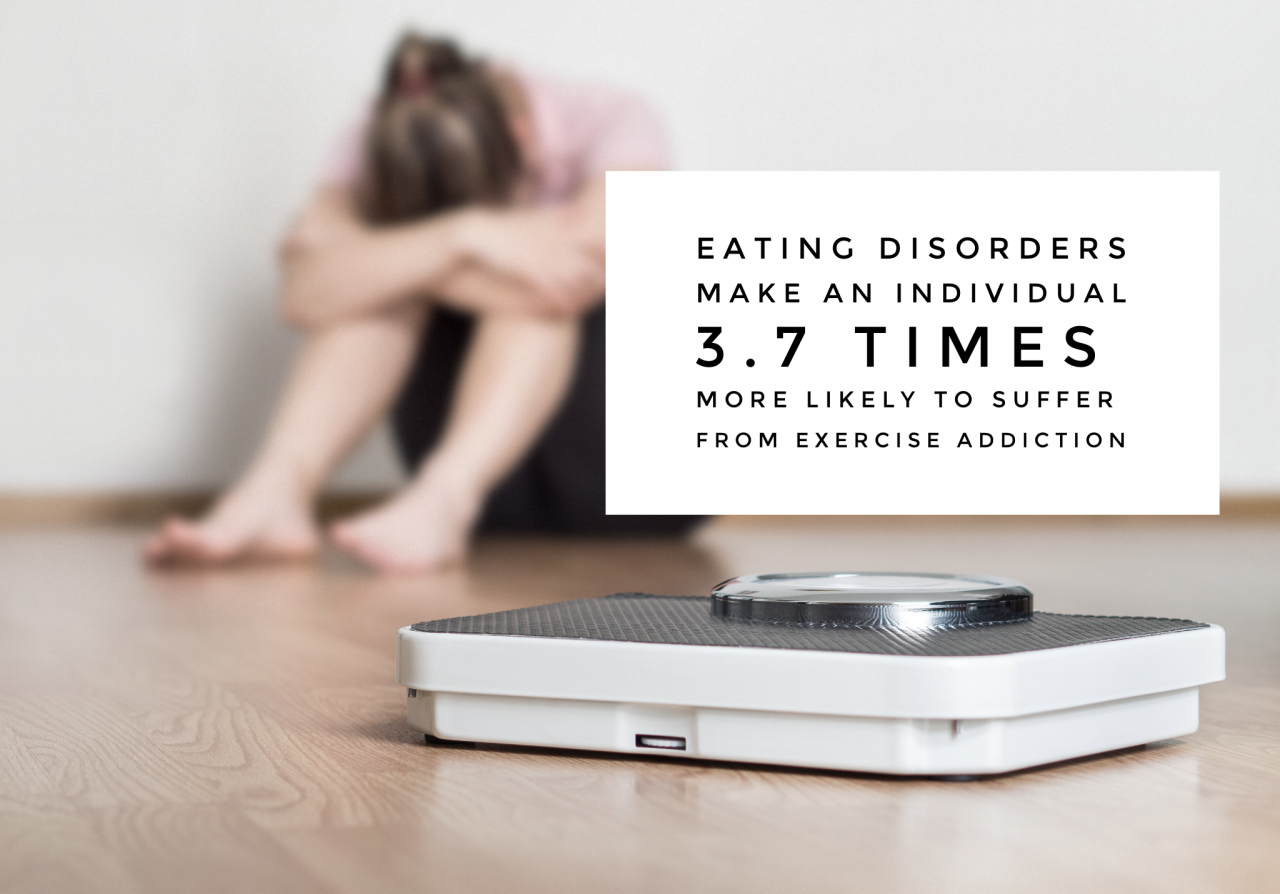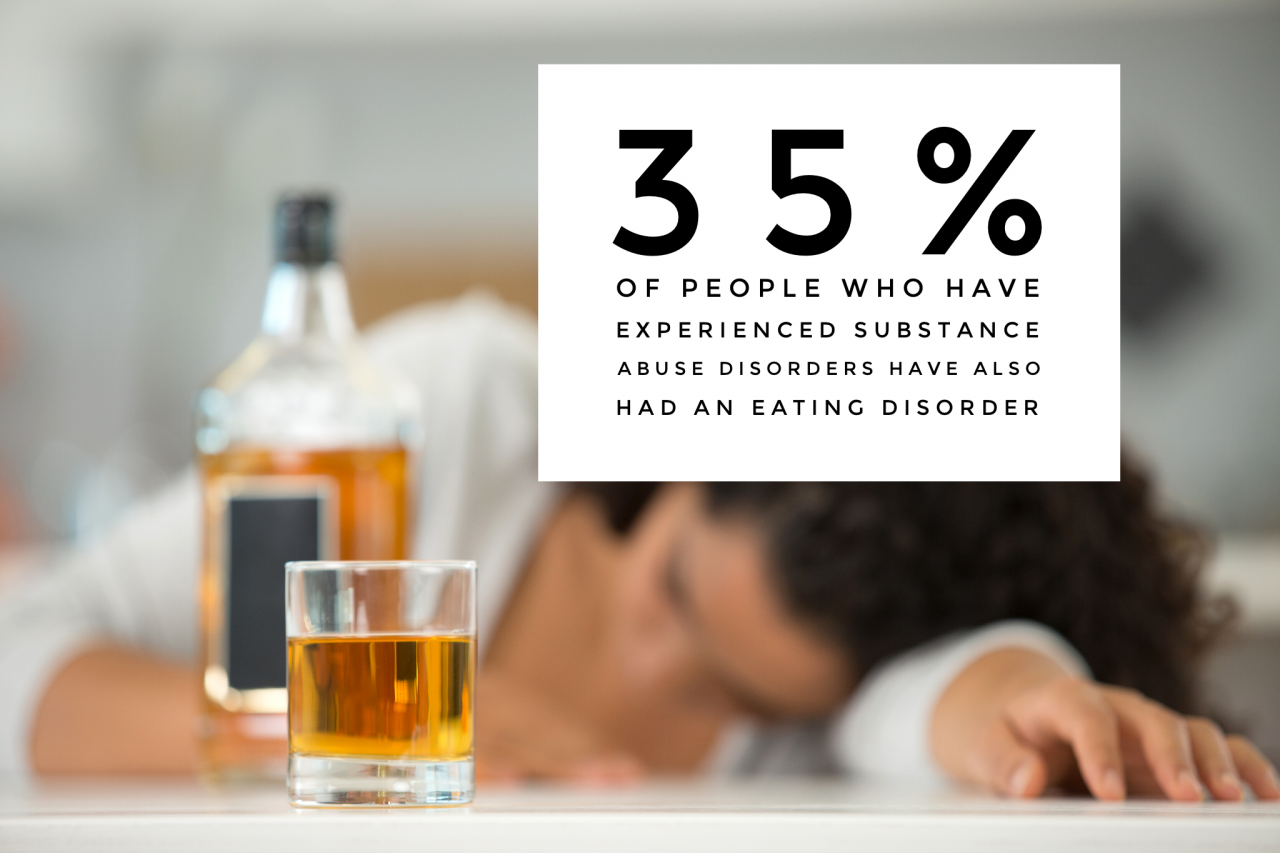
Reviewed By: Barbara Rexer, DSW, LCSW, LCADC, CCS, ICCS, DRCC
- People with eating disorders are 5 times more likely than the general population to suffer from substance abuse
- A new study shows that people with eating disorders are 3.7 times more likely to experience exercise addiction
- Addictive behaviors, particularly exercise, can be difficult to identify and diagnose in people with eating disorders
Eating disorders have long been associated with certain addictive behaviors, including substance and alcohol abuse. A new study has taken the link even further. The research, published by Anglia Ruskin University (ARU), suggests that people with eating disorders are also four times more likely than the general population to suffer from exercise addiction.
The findings demonstrate a greater need to understand addictive behaviors in those who suffer from eating disorders and might explain why this group is more susceptible to other addictive behaviors, such as substance use. Here’s a look at the research and what it means for treatment.
Eating Disorders & Addictive Behavior
For many people, exercise confers great physical and mental health benefits. But for certain personalities, it can become an unhealthy addiction. This is particularly true for those with eating disorders, who may be more prone to developing addictions. The ARU study found that nearly 40% of people with anorexia engage in compulsive exercise behaviors. It further found that those who display characteristics of any eating disorder, including bulimia and compulsive overeating, are 3.7 times more likely to suffer from addiction to exercise.

What constitutes too much exercise? The amount varies by person. Running marathons or committing to a daily workout regimen doesn’t necessarily make someone an addict. We can better define exercise addiction by the behaviors associated. Here are a few red flags:
- Exercising even when you are ill or injured
- Prioritizing exercise over work or family obligations
- Withdrawing from friends in order to exercise
- Prioritizing fitness goals, such as a weekly mileage goal, over their health impact
- Exercising beyond your doctor’s recommendations
- In women, exercising to a point of amenorrhea (missing a period)
Because of our culture’s celebration of fitness and “fit” looking bodies, these signs can be easy to miss. Indeed, we often associate fitness with wellness. We praise prolific exercisers for their motivation and self-discipline, and we often point to the benefits of exercise for those who struggle with mental health disorders and other addictive behaviors.
But taken to an extreme, excessive exercise can have serious consequences. Although compulsive exercise has not yet been accepted yet as a psychiatric disorder, many studies have found it to have dimensions of well-known psychiatric disorders, including perfectionism, neuroticism, narcissism, body-dysmorphic disorders and obsessive-compulsive behaviors.
Eating Disorders & Substance Abuse
In addition to excessive exercise, individuals who suffer from eating disorders are also more susceptible to substance abuse. According to the National Center on Addiction and Substance Abuse, people with eating disorders are five times more likely to abuse alcohol or other illicit substances than the general public.
Meanwhile, up to 35% of individuals who have been dependent on alcohol or other drugs have also had eating disorders, a rate 11 times greater than the general population. The substances most commonly associated with eating disorders include alcohol, amphetamines, and cocaine.

Although it’s hard to determine which comes first, eating disorders or substance abuse, the condition share a number of risk factors:
- Genetics
- Common family history
- Anxiety disorders
- Social pressures
- Compulsive behavior
- Social isolation
- Low self-esteem
- Past traumatic events
- History of childhood abuse
Treating addictive behavior starts with recognizing the behavior as a problem. This is often more difficult with excessive exercise than it is substance abuse, although the former can lead to the latter. For example, a person might take stimulants in an attempt to improve physical performance.
If someone you know is exhibiting signs of excessive exercise or an eating disorder, professional treatment can help. Cognitive behavioral therapy is one common approach that teaches patients how to modify unhelpful thoughts and behaviors, including false beliefs about exercise and eating.
Treatment for Co-Occurring Disorders
Inpatient or outpatient treatment can help those who suffer from co-occurring substance and alcohol abuse. At Sprout Health Group, we create treatment programs for co-occurring mental health and substance use disorders based on a personalized assessment that considers a client’s whole physical and mental health history.
Since addictive behaviors often involve underlying issues, we take a fluent approach to the recovery process, offering resources for counseling, aftercare, and ongoing recovery. We also provide aftercare resources to ensure you feel supported as you continue your recovery journey after treatment.
Addictive behaviors and co-occurring mental health disorders can often feel all-consuming, but with the right support and coping mechanisms, a happy healthy life in recovery is possible.
Have questions about addiction?Chat with one of our recovery specialists now.

Written By: Susan Kime, MA, PCP, NCC
Susan Kime, MA, PCP, NCC, is a certified counselor who has worked directly in the fields of addiction recovery and mental health. A professional health & wellness writer, she has written for myriad publications about the intersection of mental health, wellness, and lifestyle.


